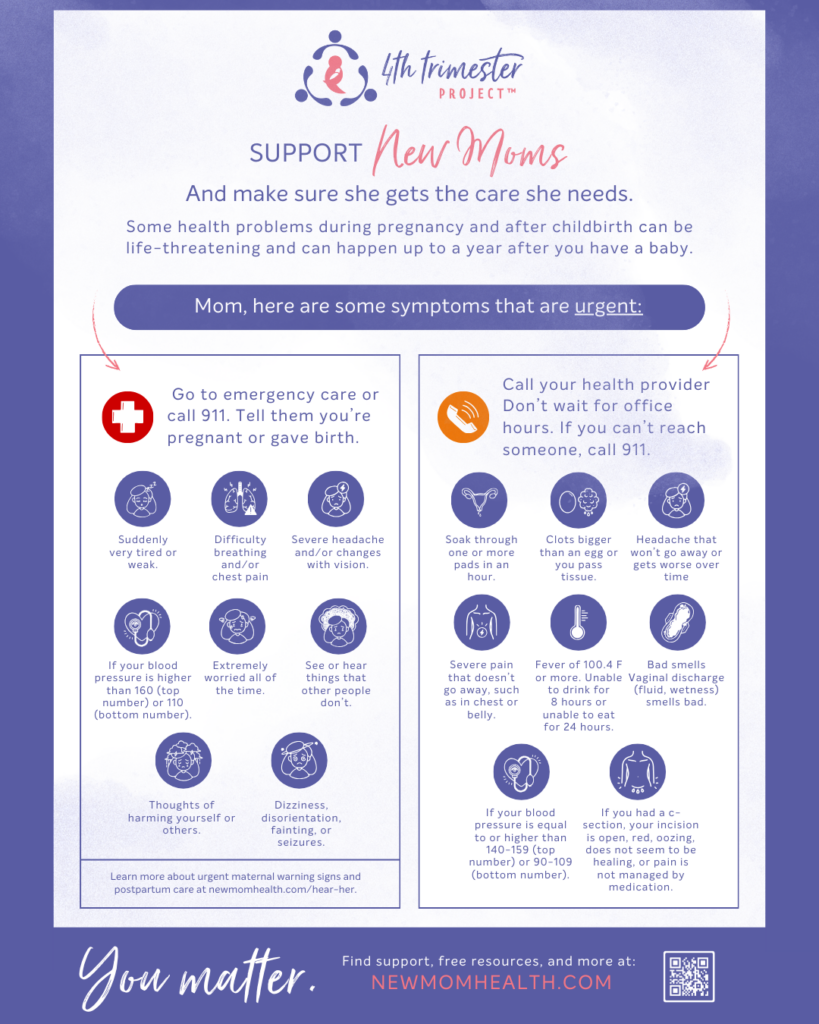
Talking with health care providers can be hard. If you are lucky to have had an opportunity to develop a good relationship with your doctor, midwife or nurse practitioner before and during pregnancy, it will be easier to talk with them during your postpartum visit(s).
Unfortunately, sometimes things happen that make it difficult to trust your health care provider. Some people have bad experiences where they are neglected, talked down to, and in some cases even ignored. People of color and same gender couples may be at extra risk due to bias – meaning that they might be treated differently because of who they are even though the providers may not be aware that they are doing it. Women may not feel that their health care providers trust them. There is much work to do to eliminate racism, fat shaming, cultural misinterpretations, language disparities, homophobia, and other forms of bias.
The care women receive after having a baby is important. You deserve to be heard and respected. If you don’t want to see a particular provider, it is okay to ask to see someone different. The system of health care needs to be built to care for women. Until the system gets better, mothers need to be good advocates for themselves. It may be helpful to bring along your partner or friend who can help you get what you need from your health care.
Be honest during your visit. It’s important to share things about your life and relationships at home and at work as they are part of your health and well-being. Sometimes women worry that their provider isn’t interested or that this information doesn’t really matter. But providing detailed information about your social, emotional, physical and financial situation helps a provider get the full picture of what’s going on for you so he/she can really help. Don’t be afraid to bring up pain or a feeling that’s bothering you, even if it’s embarrassing. Your provider’s job is to help you feel better, and he or she is required to protect your privacy.
Ask Questions! Medical visits can be overwhelming and sometimes even the most well-meaning health care provider can present too much information too quickly and in complex terms. It’s OK to ask questions and you should feel comfortable asking as many of them as you need to understand the advice provided to you.
Ask your health care team members to explain what they’re saying in plain language if they’re talking in medical-speak. It’s perfectly fine to say, ‘Sorry, I’m just not following you. Can you explain that in another way?’” Next, repeat the information back to your provider. This will help you learn it, and it will also help the health care provider know whether you understood. And if you didn’t understand everything? That’s perfectly natural, too. Your provider may need to repeat information in a different way so that it’s clearer.
Be sure your health care provider has understood what you told him or her. For example, if you talk about a concern — such as a lump in your breast — and your doctor brushes it off, don’t be afraid to bring up the issue again. We know that providers tend to want to tell patients things are fine a lot, and patients sometimes feel that this reassurance is too early. It’s fine to say, ‘I’m not sure you really heard how concerned I am about this.’” If you emphasize your concerns, your provider can explain his or her reason for reassuring you and talk more about the issue. You need to be listened to, heard, and treated with respect.
Work Together. It’s important to work together with your health care team for the best outcome. If your doctor recommends a treatment, share your worries about possible side effects or questions about other options. This is a way to actively partner with your health care providers to make treatment decisions that are most likely to work for you. Don’t be afraid to ask him or her to help you understand your options.
Finally, never give up! If you need help, sometimes women need to demand it. If you know something isn’t right, speak up again and again. It shouldn’t have to be so hard, but it can be. Your life and health matters. Ask for health care team support until you get what you need.










